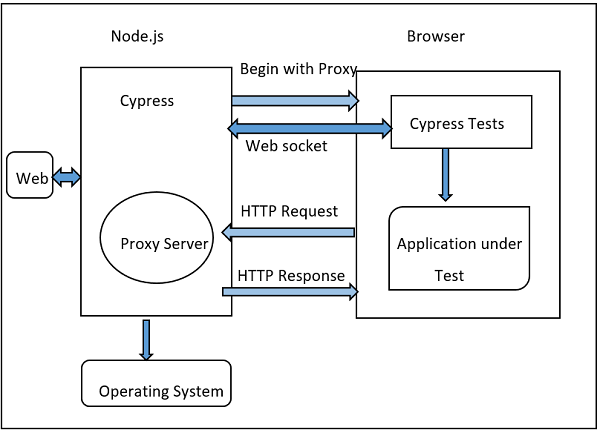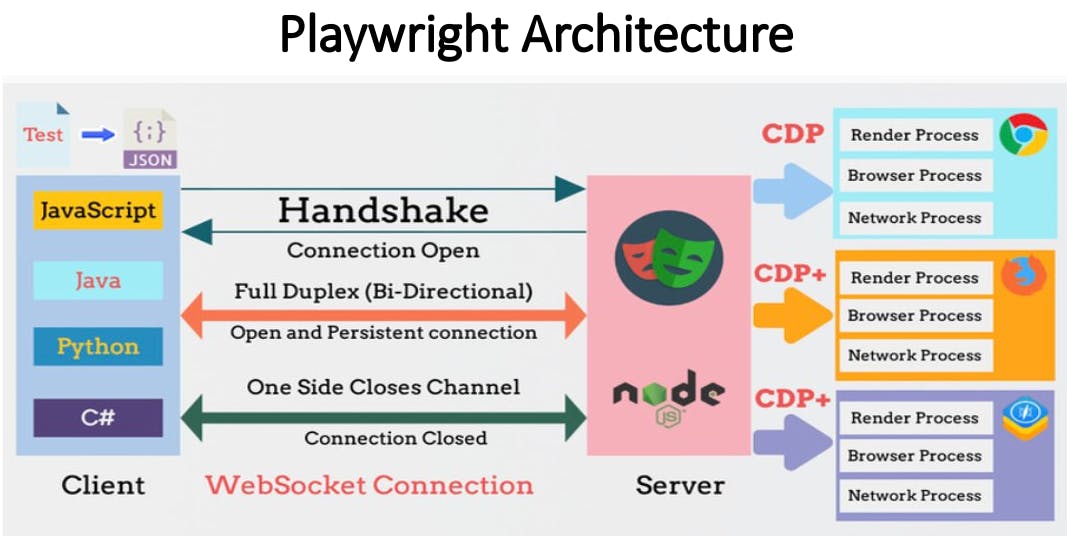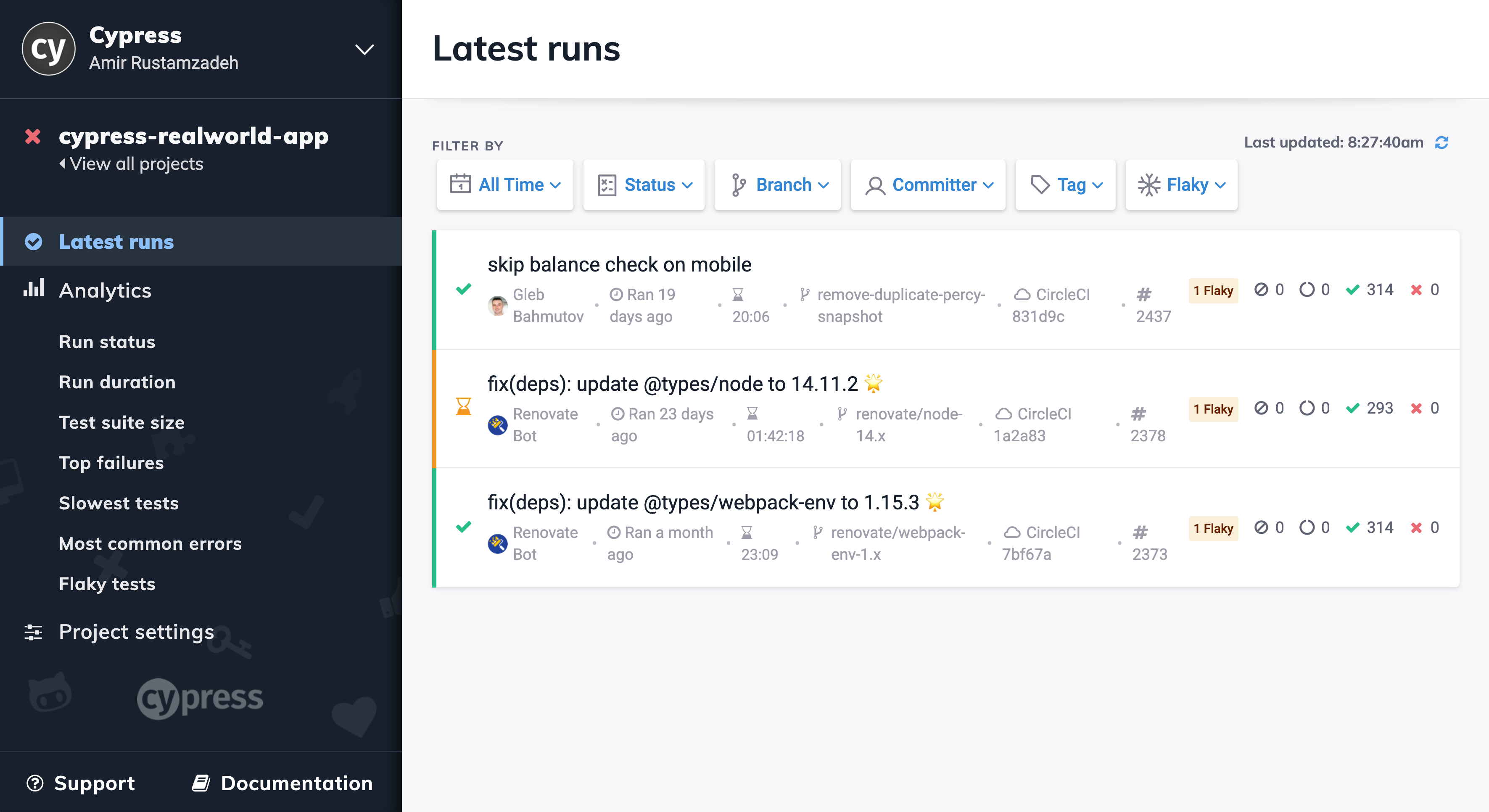

- Playwright is built for real-world testing, while Cypress is optimized for simpler in-browser workflows.
- Playwright’s out-of-process architecture, native support for complex workflows, promise-based API, and minimal dependencies make it better suited for automating full user journeys reliably as test suites grow.
- Playwright’s API is easier to read, debug, and change.
- Because it uses standard JavaScript promises instead of custom chaining rules, Playwright tests are more predictable and maintainable as teams grow and ownership shifts.
- Fewer dependencies lead to more stable builds.
- Playwright integrates core features directly and ships with a single dependency. Cypress relies on a large plugin ecosystem, which increases version friction, CI complexity, and failure modes.
- Playwright’s architecture supports complex user journeys without workarounds.
- It natively handles multi-tab workflows, multiple browser contexts, extensions, and downloads. Cypress’s in-browser proxy model makes these scenarios difficult or impossible to automate reliably.
When we built QA Wolf, we weren't just choosing a test framework—we were deciding on the type of solution we could offer our customers. That decision shaped everything from the architecture of our test infrastructure to how we write, maintain, and scale coverage.
The choice came down to two major contenders in modern E2E automation: Cypress and Playwright.
Cypress had the advantage in terms of time on the market and community size. Playwright had technical depth and enabled the development velocity we needed. We chose Playwright over Cypress for three primary reasons: architectural flexibility for complex workflows, faster test execution (up to 4x), and fewer dependencies (1 vs. 160+).
Key takeaways
- Playwright is built for real-world testing, while Cypress is optimized for simpler in-browser workflows. Playwright’s out-of-process architecture, native support for complex workflows, promise-based API, and minimal dependencies make it better suited for automating full user journeys reliably as test suites grow.
- Playwright’s API is easier to read, debug, and change. Because it uses standard JavaScript promises instead of custom chaining rules, Playwright tests are more predictable and maintainable as teams grow and ownership shifts.
- Fewer dependencies lead to more stable builds. Playwright integrates core features directly and ships with a single dependency. Cypress relies on a large plugin ecosystem, which increases version friction, CI complexity, and failure modes.
- Playwright’s architecture supports complex user journeys without workarounds. It natively handles multi-tab workflows, multiple browser contexts, extensions, and downloads. Cypress’s in-browser proxy model makes these scenarios difficult or impossible to automate reliably.
What is Playwright?
Playwright is an open-source end-to-end testing framework developed by Microsoft that enables automated testing across Chromium, Firefox, and WebKit browsers using a single API. Its out-of-process architecture allows it to automate multiple browser instances, simulate user interactions across different contexts, and run tests that interact with real browser features like camera permissions, download handling, and clipboard access.
What is Cypress?
Cypress is an end-to-end testing framework built for modern web applications. It runs in the same process as the application and uses a proxy architecture that makes it fast to install, simple to write, and easy to run. For single-page apps or basic workflows that stick to a single domain and user session, Cypress works well.
Comparing Playwright vs. Cypress
How Playwright's architecture enables complex workflow testing
Playwright's out-of-process architecture enables complex test scenarios that Cypress cannot handle, including multi-tab workflows, browser extensions, and native download handling. Cypress runs in the same process as the application and uses a proxy architecture that introduces rigid boundaries. Tests that span multiple tabs, switch browser contexts, or involve extensions and downloads require heavy workarounds or can't be automated due to architectural limitations.
These are the kinds of tests our customers need, especially as they scale beyond initial coverage and start automating full user journeys. Cypress is popular for good reason—it’s fast to install, simple to write, and easy to run. The UI is polished, and the local dev experience is comfortable for frontend teams writing JavaScript. But those strengths become constraints when teams need to automate more complex workflows.

Playwright avoids these constraints by design. Its architecture supports multiple browser instances and direct interaction with real browser features, such as permissions, downloads, and clipboard access. This makes it better suited for end-to-end workflows that reflect how users actually move through an application, rather than only the scenarios that fit within a single-page model.

How Playwright's API design reduces development time
Playwright uses standard JavaScript promises, avoids custom chaining methods, and mirrors how developers write asynchronous code elsewhere in the stack. That consistency makes the code easier to read, reason about, and debug.
Cypress, by contrast, introduces its own layer of syntax. Developers have to learn how Cypress manages control flow, how it scopes variables, and how to avoid anti-patterns like hard-coded waits.
These aren't insurmountable problems, but they increase onboarding time and raise the cost of code maintenance, especially as the team grows or shifts responsibilities. We use Playwright not just because it's easier to write tests, but because it's easier to change them. Our tests need to be portable and understandable. When something breaks, we know where to look and how to fix it.
Why Playwright's design makes tests more stable
Playwright integrates features directly into its core, minimizing dependencies and reducing version friction. At last count, Cypress had more than 160 dependencies in a standard install. Playwright had one.
Test reliability isn't just about flakiness—it's about build stability, consistent environments, and clear failure states. Cypress's plugin-based approach gives teams flexibility, but that flexibility comes with risk. Plugins can conflict with each other or break when new versions are released.
The cumulative build complexity adds overhead to every CI run, slowing builds, increasing setup time, and introducing additional potential points of failure. Playwright avoids this entirely by integrating features directly into its core. That minimizes dependencies, reduces version friction, and lowers the risk of unexpected interactions.
Fewer moving parts means fewer surprises. That matters when you're running hundreds or thousands of tests per day. It's not just about keeping the green lights on—it's about ensuring your team can trust the results and move faster without second-guessing the infra.
Playwright vs Cypress: Performance benchmarks
Playwright runs up to 4x faster than Cypress according to benchmarks from Applitools and LambdaTest. This speed advantage comes from Playwright's WebSocket-based architecture that provides near-native browser API access, avoiding the proxy layer Cypress uses.
That number may sound small on a per-test basis, but it adds up fast. If you're running 500 tests per build, shaving 200 milliseconds off each one means saving over a minute and a half per build. Multiply that by every deployment across every team, and the performance gains turn into real productivity. Less waiting. More iteration. Fewer bottlenecks.
Playwright vs Cypress: Community size and growth trends
Playwright dominates Discord servers, Reddit posts, GitHub Discussions, and AI tools like GitHub Copilot. As of 2026, Playwright averages 20-30 million downloads per week and passed Cypress in weekly NPM downloads in mid-2024.
Cypress has the advantage of history. It's been around longer, and you'll find years of tutorials, GitHub issues, and Stack Overflow threads to help solve everyday problems. That library of tribal knowledge can be helpful, especially if your team is just getting started.
Community support looks different today than it did a few years ago. Cypress' community may be large, but it's not necessarily active in the places developers go now.

And most importantly, Playwright is shipping fast, supporting more browsers, languages, and use cases with every release. Sure, GitHub stars and download counts aren't everything. But they do signal where developer attention is headed—and right now, it's pointed at Playwright.
Playwright's broader feature support for real-world testing
Beyond the core technical differences, Playwright offers broader support for the types of tests we write:
Cross-browser coverage
Playwright supports Chromium, Firefox, and WebKit—all natively. That provides us with absolute parity testing across the entire browser ecosystem, not just Chrome derivatives.
Mobile emulation
We can simulate specific devices, change user agents, and test touch input. Cypress can't natively do any of this.
Test runner flexibility
Playwright works with a variety of runners, including Jest, Mocha, Jasmine, and AVA. Cypress only supports Mocha.
Multi-language bindings
While we write our tests in JavaScript, Playwright also supports Python, Java, and .NET. That flexibility can be helpful for teams working across stacks or migrating coverage.
These are increasingly common requirements for teams trying to test across real-world scenarios.
When Cypress might be the right call
Cypress still shines for in-browser, visual authoring and offers Cypress Cloud for flake analytics and trends. Playwright now matches the "live, step-through" feel via UI Mode and pairs it with a powerful Playwright Trace Viewer and tight VS Code integration.
If you want a managed dashboard, Cypress has the advantage. If you want fast CI triage with shareable traces and strong IDE workflows without a paid cloud, Playwright is at least on par—and often nicer. Community-wise, Playwright is larger by downloads and stars, though Cypress retains a big legacy footprint.

Why we went with Playwright—and what that gives our customers
Our decision wasn't about developer preferences or ecosystem size. It was about building a solution that can handle real-world tests at scale.
Playwright gives us the reliability, performance, and control we need to write and maintain hundreds of tests for each customer. It handles complexity without workarounds. It keeps dependency count low and builds stably. And it runs fast—really fast—so our customers get results when they need them.
We invested in Playwright because it fits our specific use case and allows us to deliver the kind of zero-effort QA experience that our customers need to ship with confidence.
If you're weighing frameworks or planning out your automation strategy, we're happy to geek out with you on frameworks.


Playwright vs. Cypress: what are the biggest differences for end-to-end testing?
The biggest differences are architecture, browser coverage, speed, and ecosystem flexibility. Playwright uses an out-of-process, WebSocket-based architecture that enables multi-tab and multi-context testing, while Cypress runs in-browser with a proxy model that creates constraints for complex workflows. Playwright supports Chromium, Firefox, and WebKit (Safari), runs up to 4x faster in published benchmarks, and has fewer core dependencies (Playwright: 1 vs Cypress: 160+), which can reduce CI friction.
Why do QA teams choose Playwright over Cypress for complex workflows?
Teams choose Playwright when they need to automate workflows that commonly exceed Cypress's architectural boundaries—such as multi-tab journeys, cross-context authentication flows, browser extensions, and download verification. Playwright supports these natively because it controls the browser out of process. Cypress can be good for simpler, single-domain SPA-style tests, but complex user journeys often require workarounds or are not fully supported.
How much faster is Playwright than Cypress in real CI runs?
Playwright can run up to 4x faster than Cypress. The speed advantage is largely due to Playwright's WebSocket-based approach that avoids Cypress's proxy layer. Even small per-test savings compound: shaving ~200 ms per test across a 500-test suite can save 1.5+ minutes per build.
Can you migrate from Cypress to Playwright without rewriting everything from scratch?
Yes. Both frameworks use JavaScript and TypeScript, but their APIs differ. Migrating primarily involves translating Cypress’s chained command style to Playwright’s async/await model and adapting tests to Playwright’s locator patterns.




